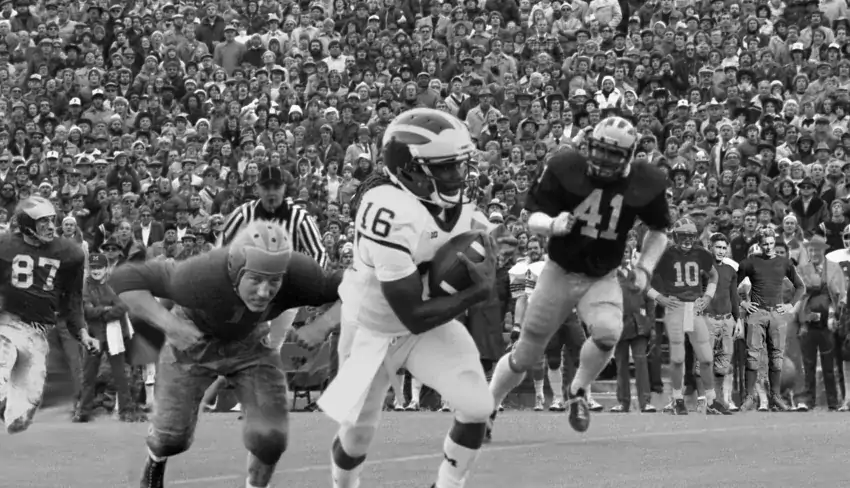
The Teams Tourney: Play-In

Sponsor Note: I can't get Matt Demorest of HomeSure Lending to sit down for a beer recently because rates recently dropped to the lowest they've been since 2015-'16. If you bought or financed your house in the last year or so, for some reason Matt would rather personally handling whether a refinance now can save you some coin than listen to me be mopey about football and hockey.
He also stepped up to buy us some new equipment and cover the hosting (and host) costs for Sap and I to launch our new podcast, The Teams (first episode here) where we cover one historical Michigan football season per episode. In the process we had to go through a lot of historical teams. Since I have to do the research anyway, I figured I would turn it into some offseason #content you can flip through while Matt is working on your loan.
A Tournament of Great Michigan Football Teams Past
Mostly I wanted a way to have something about all these teams in the blog history. I went with an NCAA basketball-style tournament to keep it interesting as we go. I'll take a few games per episode, pit two great teams against each other, and eulogize the loser. The seeding went like a committee might: more wins, big wins, big postseason wins etc. count, and national champs are treated like conference champs. Since football's gotten harder to win over the years, further back in time means weaker SOS, relegating Bo teams from the Big 2 Little 8 Era to low majors, etc.
We'll start today with the play-in round.
---------------------------
16th Seed Game 1: 1885 vs. 1895
Worthy though they were, Horace G. Prettyman's squad would have gaped at the advancements in the game and Michigan's program just a decade later. Backed by hundreds of dollars raised from the students themselves, and organized by a man who would do more than anyone else to build a premier athletics program at the University of Michigan, the 1895 team would steamroll their forebears, then everyone would go down to Hangsterfer's Saloon (a Mongolian BBQ today) for drinks and songs. 1895 wins 42-2.
The 1895s advance to take on Charles Woodson and the 1997 team. Maybe they can get Prettyman back?
[After THE JUMP: About the 1885 team, and a few more like this]
---------------------------
About Team 7 (1885)
[UM Bentley Library]
Summary: 3-0
Big Wins: @Windsor Club 10-0 (or 10-2, it's disputed), Windsor Club 30-0, Detroit Peninsulars 42-0
Worst Loss: none
Rivalry Results: None of them existed, but we did beat Windsor twice. U-S-A! U-S-A!
Star: Second-year captain and redshirt junior* Horace Prettyman
Shining Moment: Sharing a beer at Hangsterfer's Saloon with the Windsor team after pulling off the weirdest home-and-home ever
Captained by Michigan legend Horace Greely Prettyman, the 1885 squad went undefeated, including (but not counting) in a game reportedly played on roller skates. The competition itself, however, was vastly less challenging than finding someone to play against. Two games were against Windsor, the first a victory across the border under Canadian rules, and the second against the same team a week later.
The Windsor faculty wasn't interested in playing the return game and told his team it was canceled, but Prettyman and the Windsor captain managed to round up enough players, teach them the American rules while driving them to Ann Arbor, and get in a game, feting their defeated opponents afterwards. A few weeks later they got in a game against the Peninsular Cricket Club (the precursor to the Detroit Athletic Club and featuring the best athletes in the city) on Thanksgiving Day, starting a Detroit tradition.
* [The eligibility rules were a bit more relaxed back then. Prettyman enrolled in 1882 as a 24-year-old freshman, and didn't play in 1883 since the whole team didn't. He then was chosen as captain in 1884, 1885, and 1886. After a few years in the workforce Prettyman got back on the team in 1888 and played three more seasons. Like I said, eligibility rules weren't very intense]
---------------------------
16th Seed Game 2: 1896 vs. 1898
The battle between the second team to star Gustave Ferbert and the second team coached by Gustave Ferbert would come down to Chicago. While the 1896s were flashier, outscoring their opponents 262-11 and shutting out eight of nine, the '98s were a tougher bunch, playing Michigan State, Notre Dame, their own alumni, and outdoors. Depth ultimately won this one, as the 1896 team wasn't the same when it had to play a half without the governor-elect's son. 1898 wins 12-11, and one of their fans writes a song about them on the way home. They remain undefeated, and advance to play the 1947 national champs.*
* [The REAL ones, not you Notre Dame who doesn't count losing their bowl game]
About Team 11 (1896)
[UM Bentley Library]
Summary: 9-1, 2-1 (t-2nd place, newly formed Intercollegiate Conference of Faculty Representatives)
Big Wins: 6-4 at Minnesota, 40-0 vs Lehigh, 10-0 vs Oberlin, 16-0 at Purdue
Worst Loss: 6-7 at Chicago
Rivalry Results: See worst loss
Star: Halfbacks Gustave Ferbert and Hazen Pingree Jr. (Sr. was elected governor that year)
Shining Moment: Right tackle Fred Henninger is pushed over the goal line for Michigan's winning touchdown at Minnesota. Michigan fans in the bleachers celebrate with cowbells.
In its first year of existence the Big Ten established its most enduring trademark: screwing Michigan out of a rivalry win at the end of the season. Scheduling at the time was still subject to the whims of each school and adhered to prior agreements, so Michigan only got in three games against their new conference foes, instead honoring games against Michigan Normal (EMU), Grand Rapids, UIC, Lake Forest, Lehigh, Oberlin, and Wittenberg. Under new head coach William Ward—an expensive purchase from Princeton—going into the Chicago game on Thanksgiving Michigan had given up just 4 points (all to Minnesota) in 9 games, scoring 256 in return. The Lehigh blowout put Michigan in the conversation for national champs, since that was an Eastern powerhouse that nearly beat eventual national champion Princeton. Minnesota too had been a national championship aspirant until Michigan came to town. Take care of business in Chicago and Michigan's #1.
They didn't. Played in the new indoor(!) Chicago Coliseum just four days after their tough Wittenberg contest, Michigan kept driving into Maroon territory and coming up short. A blocked punt safety and a touchdown (then worth 5 points) were enough to give Chicago the 7-6 edge and back Wisconsin into the first Big Ten title. Michigan would have to wait two years for vengeance and their first Big Ten title.
---------------------------
11th Seed Game 1: 1995 vs. 1996
Two four-loss seasons at the start of the Carr era to follow the two that ended the Moeller years. Two seasons rescued by improbable upsets over title-aspirant Ohio State. Both teams also dropped games to Northwestern, which is a thing virtually unheard of until the mid-'90s. They also featured more or less the same players: Rod Payne, Jarrett Irons, Glen Steele, Hoody Hankins, Jon Jansen, Zach Adami, Chris Floyd, and of course underclassman Charles Woodson.
1995 had a better offense with Tshimanga Biakabutuka (as opposed to C-Will), Jay Riemersma (Jerame Tuman), Joe Marinaro (Damon Denson), Jon Runyan (Thomas Guynes), and Amani Toomer & Mercury Hayes (Tai Streets & Russell Shaw) at receiver, but 1996 had a better defense, with Clint Copenhaver settling the sore SAM spot, Sam Sword emerging at WILL, and Ben Huff (DT), Marcus Ray (SS), Woody Hankins (CB) and Daydrion Taylor (FS) filling in fine for the departed Jason Horn, Chuck Winters, Clarence Thompson, and Steve King. New WDE David Bowens was a bit unstable, but an improvement on unflashy Trent Zenkiewicz.
The big question on these teams was quarterback. Scott Dreisbach was maddeningly inconsistent, Brian Griese was maddeningly suspended, and both were still inexplicably behind fan-demanded high school superstar Scot Loeffler (plus freshman Tom Brady) or—for the more running QB-inclined—local star DiAllo Johnson. It was a frustrating time, but since Fred Jackson was the OC for both of these teams, the edge goes to the team with the more consistent running game. 1995 wins 31-23 as Biakabutuka runs for 313 yards. They next face Yost's WWI-depleted 1918 National Champions.
About Team 117 (1996)
[Mike Desimone]
Summary: 8-4, 5-3 (t-5th place) Big Ten
Big Wins: 13-9 at Ohio State, 20-13 at Colorado, 45-29 vs Michigan State
Worst Loss: In retrospect it's 9-3 at lowly Purdue or 29-17 to Penn State, but man, losing to Northwestern AGAIN sucked.
Rivalry Results: Beat Ohio State and Michigan State, also won the Jug (ND was on a short hiatus)
Stars: C Rod Payne, MLB Jarrett Irons, NT Will Carr, CB Charles Woodson
Shining Moment: Marcus Ray picks off Germaine's short Hail Mary, runs out the clock, and slides down
I was just a high schooler back then so my takes were hot, but I was also coming up on my peak Michigan fandom at the time so I had many of them. For that reason it's harder to put 1996 into perspective than the year that just ended. Michigan had *GREAT* players—a better overall roster than the one that would win a national championship the following year—and the sense of Michigan fans for that year that the coaches lost it for them has never quite left me. I mean: "Offensive Coordinator Fred Jackson." Forgive my teenage self for not believing Lloyd Carr would go on to be a Hall of Fame coach at Michigan.
They did have to replace a lot on offense, and were ranked 12th preseason because of it, but 1995 ended strong and so much of the defense was coming back. The 17-16 loss at Northwestern was a dagger. Two years in a row! To Northwestern!!!! Michigan would creep back into the Top 10 by beating Nick Saban's least academically eligible Michigan State team, but a loss at Purdue and the following week to Penn State really got the Lloyd grumbles a-rollin'. If he hadn't upset Ohio State—and that game felt like a lot of luck at times as Buckeyes kept missing tackles and Joe Germaine kept missing open receivers and the Buckeyes kept settling for field goals—I don't know if Carr makes it to 1997. A 17-14 loss to Alabama in the Outback Bowl and the graduation of everyone I still liked on the offense led to a BPONE of an offseason. 1996 was *supposed* to be The Year! Instead it left little reason to believe The Year that was coming was even possible.
---------------------------
11th Seed Game: 2012 vs. 1979
One year was a miserable slog with a generational talent that the coaches didn't know how to properly use that made every Michigan fan question whether our hard-ass, old-school coach was capable of adjusting—or even knew about—the mind of modern football strategies that would come to dominate the next decade. The other was the same with an even dumber last-second victory at home over a team Michigan should have slaughtered.
Yes there was a season when college football was all about the high-flying spread passing games and the ridiculous offensive numbers they put up, and Bo Schembechler was driving Michigan fans nuts by sticking to his old school philosophies. A 12-10 loss to Notre Dame was the only game that really tested Bo's 1979 squad, though a 21-7 win over then 16th-ranked Michigan State felt like a pretty good accomplishment. What sunk the '79 team was a bad ending: 24-21 to a very good Purdue passing outfit, an 18-15 loss to Ohio State (another team that had learned to pass), and finally a bowl loss to friggin' North Carolina, wherein UNC Lawrence Taylor took out the knees of quarterback John Wangler.
That team—which spent way too long trying to run with QB BJ Dickey and didn't even start Anthony Carter—would have slaughtered an outfit like Brady Hoke's second team, which never did manage to beat a ranked team. 1979 wins 21-7, all on Carter catches. They'll face the 6th seed 1986 Wolverines, whose quarterback has already guaranteed a victory.
About Team 133 (2012)
[Eric Upchurch]
Summary: 8-5, 6-2 (t-2nd Where's Wisconsin? Division)
Big Wins: 12-10 vs MSU, 42-17 vs Iowa in the November sun
Worst Loss: Pick the Denard Elbow Game at Nebraska or the Alabama defenestration to start it
Rivalry Results: Lost a close game at Notre Dame, won stupid vs a bad MSU, lost stupid vs Urban's first OSU team
Stars: QB Denard Robinson, LT Taylor Lewan, backup QB Devin Gardner
Shining Moment: A Northwestern safety tips a pass that's over Roundtree's head in double-coverage down to Roudtree, who catches it to set up the tying field goal with seconds left.
On the opening kickoff, suspected star cornerback Blake Countess went out for the season. On some drive not long after Denard threw and interception because Roy Roundtree was bodied out of bounds by a cornerback more receiver-shaped than Roundtree was. Denard then threw his shoulder into the guy, and was never quite the same.
So began the decline after Hoke's golden rainbow season, and the growing realization that the person in charge of the athletic department was also its greatest enemy, as the debacle in Dallas was followed by Air Force, a cutblocking triple-option team that Michigan was lucky to get past down just one starting defensive lineman. A trip to South Bend to face the other participant in that year's championship game was even more frustrating since it proved the coaches were actually serious about not using Denard as a run threat.
Michigan did at least get a win over (a bad) MSU, though it took a bumbled two-minute drill and a long kick at home. Then at Nebraska Denard's elbow finally gave out. With backup QB Devin Gardner playing receiver, Russell Bellomy was inserted and the air went out of the season. Gardner took over for Minnesota, and after a half his mind melded with Jeremy Gallon. The Northwestern game was another near disaster: Unstoppable Throw God Trevor Siemian carved up the secondary, Michigan botched its offensive gameplan, and needed not just the extraordinarily lucky tip to Roudtree but a "RUN HERE!" 3-3-5 playcall by Greg Mattison on 4th down in overtime.
A weird sunny day when things all went smoothly against Iowa set up an Ohio State game that Michigan somehow led much of the way, thanks to bad OSU tackling and two fumble recoveries. But Ohio State quickly caught on to the fact that Denard couldn't pass, Michigan's offense was shut out in the 2nd half, and the defense spent the last 8 minutes trapped on the field with Carlos Hyde. Michigan went to the Outback Bowl, wore some more ridiculous uniforms that made their numbers illegible on TV, and lost to South Carolina on a last-second TD throw.
---------------------------
Next time: Let me know in the comments which Round of 64 matchups you'd like to see first.
January 18th, 2019 at 4:12 PM ^
Woof.
January 18th, 2019 at 4:23 PM ^
I'm going to take the 10 seed 2015 team on the left over the 11 seed 2015 team on the right and hope this results in a singularity.
Aw, you fix. There goes my bracket.
January 18th, 2019 at 5:01 PM ^
Oops. Typo. One of those was '75
January 18th, 2019 at 4:27 PM ^
I feel like 1996 is getting overrated by suggesting that it had a better roster than 1997. There were some departures (Bowens and Irons the most notable) but Anthony Thomas was a key supplement to the offense. And, in Brian Griese, Michigan finally had a stable and reliable (if not generally spectacular) QB.
The 1996 offense remains one of the three worst of my lifetime. 1997 wasn't great, but it was better than that.
I was born the day of the 1979 UM-OSU game, so I have no personal experience to share about that team, but I'll bet it wouldn't have gotten blown out by Alabama the way the 2012 team did (Bama finished #1 in the 1979 season if you'd like to throw up a bit in your mouth), so I think that was a good choice.
January 18th, 2019 at 4:32 PM ^
I think the 1996 team had a lot of talent going to waste with bad coaching. Fred Jackson should not have been made offensive coordinator, . I was born just a month after you but I remember it well.
I did a lot of eyeballing to seed the teams, but most of them I knew something about already. I didn't want the seeding to match what I thought were the best teams. More like how they would be seeded if you didn't know much about them and were basing it on wins and conference championships.
January 18th, 2019 at 5:11 PM ^
I'm sure the seeding is fine, good for controversy. Interesting matchups like 2012 vs 1979 are at the heart of offseason message board discussion type stuff.
Going to have to agree to disagree about 1996 vs. 1997. I just deleted a big write-up because we agree on the more pertinent question, which is that 1995 had better tools than 1996. 1996 had, in my opinion, the worst skill position lineup of any team between 1985 (when my memories begin in earnest) and the onset of the RR era, with only 2001 really able to join that discussion (rescued by Marquise Walker).
January 18th, 2019 at 5:52 PM ^
The 1996 team holds a special place in my heart because its my freshman year team. The fact that I finally pulled the trigger on a gorgeous #37 white Jarrett Irons replica just two weeks ago speaks to this. The offense was terrible, but the defense had one of the greatest collections of names in history.
January 18th, 2019 at 10:13 PM ^
If you ask the players, had Dreisbach not hurt his hand, they believed they would have won the MNC.
His throwing hand still looks wicked bad.
January 18th, 2019 at 4:31 PM ^
In 2012, Countess was injured on punt coverage after we forced a Bama 3 and out on their first drive.
Against Iowa, we did lose Fitz Toussaint for the season with a broken leg
January 18th, 2019 at 5:00 PM ^
Shoulda mentioned the Toussaint injury. Only moment of cloudiness all game. Eric got an incredible photo of Hoke holding Fitz's helmet.
January 18th, 2019 at 4:51 PM ^
I think you've underrated the '86 and '89 teams. Not sure why they're below a handful of outfits (eg '11, '03, '91 and '92). Both years were stacked with experienced guys who were really good at football and it took couple of really strange games to keep them out of the MNC.
Why do you have '88 seeded at 9? They lost to the #1 and #2 ranked teams in the country by a total of three (3) points and went on to win the Rose Bowl. Final ranking was top 5.
January 18th, 2019 at 4:59 PM ^
Don't pay too much attention to the seeding, which had to underrate the older teams to not have this be a Bo vs Yost bowl. That should come out in the games.
January 18th, 2019 at 6:49 PM ^
Start from the 8-9 games and work our way out to the 1/16 games? This is fun
January 18th, 2019 at 7:27 PM ^
FYI - Vegas has the 1997 team laying 63 1/2 to the 1895 team. Over/under is 71. The experts are talking about a size advantage and athleticism advantage or something along those lines. Vegas always knows their shit, so I am going to lay the points and take the under.
January 18th, 2019 at 8:01 PM ^
You know Lloyd. He will choke the game with Chris Howard and it will get nervously within 13 in the 4th Q
January 18th, 2019 at 7:41 PM ^
Was Horace Prettyman the most esteemed member of the Ann Arbor Men's Sitting Club?
January 18th, 2019 at 8:00 PM ^
Founder and the reason they had to put term limits on the presidency of it.
January 18th, 2019 at 8:14 PM ^
85 is my favorite team but 97 wins this thing
January 18th, 2019 at 9:33 PM ^
This is going to be a fun read.
January 19th, 2019 at 11:26 AM ^
The "team" podcasts and now this--terrific. I am looking forward to the rest of these immensely. I am sure I will want to argue with some of your results, but the best part will be reading the "eulogies" anyway. Thanks for doing this.
January 19th, 2019 at 12:56 PM ^
Quite an endeavor! If you have the steam to write it I'll make the time to read it. Enjoyable thus far!
January 19th, 2019 at 2:02 PM ^
"That team—which spent way too long trying to run with QB BJ Dickey and didn't even start Anthony Carter"
In 1979, Dickey was the heir to Leach as an option QB, and he was in the game primarily to run the ball and hand off on option plays, not throw it. Dickey started 7 games and had 91 passing attempts. Wangler started only 4, yet had 130 pass attempts.
It was glaringly apparent to all of us in the stands that while Dickey was more effective running the ball, Wangler was far more dangerous throwing it, and the longest passes completed by each guy supported that impression:
Dickey's longest completions in his games were: 22, 23, 10, 66, 11, 14, 30 yds.
Wangler's longest completions in his games were: 20, 15, 39, 58, 26, 45, 71, 20, 66, 53.
Wangler had deep-strike capabilities that Dickey just didn't seem to have.
Alan Mitchell started at WR for 10 games, and had 7 receptions for 91 yds; 12.9 yds/reception.
Carter started just 2 games, but had 17 receptions for 462 yds; 27.2 yds/reception
I don't know exactly how many passes Carter caught from Dickey vs how many he caught from Wangler, but it seemed clear that Wangler had a connection with AC that wasn't there with Dickey. It was extremely frustrating to the student fans around me to see Wangler on the sidelines and Carter barely utilized when it was obvious Wangler had the ability to get him the ball. Naturally the Indiana game cemented that impression.
The frustration got bad enough that at some point during the season some students in my section started a call-and-response chant: "Take out the Dick, put in the Wang!"
I've always wondered if Wangler and Dickey were aware of that.
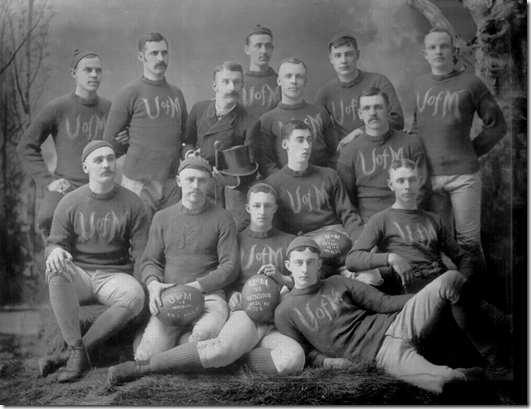
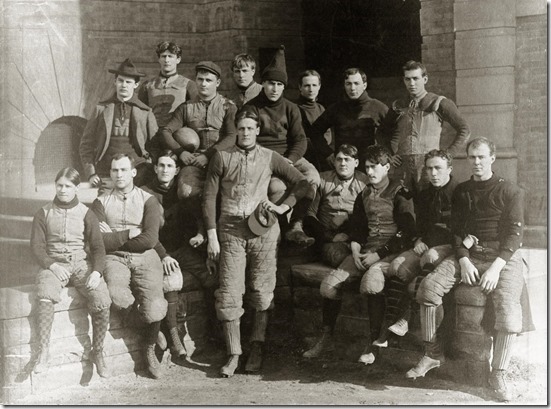
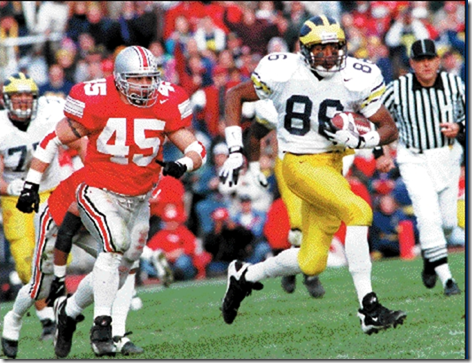
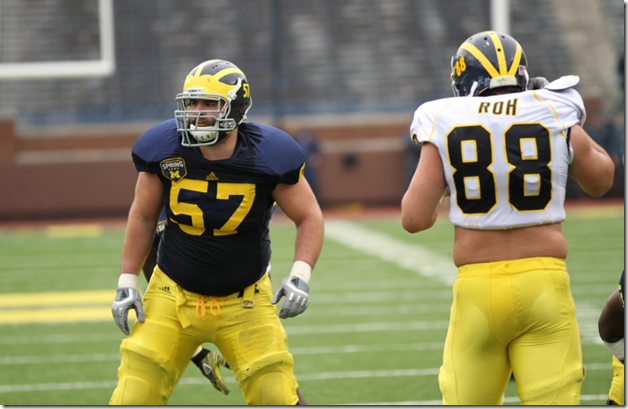
Comments